Discover the magic of falling in love
through music |
| In Spanish |
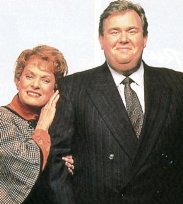 I’ll start by posing the following question: what makes a film special?. To be more precise, what ensures that a film will be particularly special? That, no matter how many similar movies you have seen, it is that one, and that film in particular, within any given genre, that is something special for you. Maybe is it because it made you feel involved in the events narrated, or because it made you feel identified greatly with one of the characters, as a consequence of which it has succeeded in touching your very soul? And maybe that you will never forget that day you saw the movie for the first time? And here I’m not just referring exclusively to a movie. I’ll start by posing the following question: what makes a film special?. To be more precise, what ensures that a film will be particularly special? That, no matter how many similar movies you have seen, it is that one, and that film in particular, within any given genre, that is something special for you. Maybe is it because it made you feel involved in the events narrated, or because it made you feel identified greatly with one of the characters, as a consequence of which it has succeeded in touching your very soul? And maybe that you will never forget that day you saw the movie for the first time? And here I’m not just referring exclusively to a movie.
With Chris Columbus as responsible for both the script (written with a special affection and tenderness in spite of their indispensable comic concessions) and direction, Only the Lonely has an exquisite rhythm and gallery of characters, and despite what might appear without knowing the film, it reaches far beyond what we might expect at first glance. This simple story is about an ordinary neighborhood guy, John Candy, who lives with her Irish-born mother, an extraordinary Maureen O’Hara, with a Greek neighbor who has an interest in her, but inaccessible to the despondency of their slights, an Anthony Quinn paying homage to different roles throughout his career (and also to himself?), who falls in love like a kid with a sweet and fragile girl he meets at a funeral home, a lovely Ally Sheedy. As I said, it is not a complex story, but a story with a soul, a story in which everyone involved put their hearts, and a special affection, turning the whole into a movie that, once seen for the first time, it is kept inside, and you cannot help but smile when remembering its scenes or characters that, inadvertently, stuck with you.
In order to compose the score, in this case the director, an usual John Williams collaborator, resorted to a sublime Maurice Jarre, responsible for collecting a certain Irish feeling, a gentle Irish twist in his music, while succeeding, at the same, in getting us all excited by the love story of the film with a subtle and beautiful romantic score.
 Jarre structures the composition around three main themes, the leit-motif devoted to the mother, with a certain touch of nostalgia to Ireland in the melody («Rose«), the motif devoted to Teresa, that brittle and shy girl who will fall in love with our hero and will open the doors of happiness to him («Teresa«), and the actual love theme, which is used in all the scenes where any of the characters is involved in a romantic situation (moments of «Rose«, «Ladder Proposal» and the beautiful final rendition found in «It could’t be Better«), but especially in the relationship between Candy and Sheedy, who is slowly permeating the spectator and the listener, like a gentle drizzle that persistently keeps falling gently, hardly being noticed, but gradually reaching deeper and deeper within each of us. Jarre structures the composition around three main themes, the leit-motif devoted to the mother, with a certain touch of nostalgia to Ireland in the melody («Rose«), the motif devoted to Teresa, that brittle and shy girl who will fall in love with our hero and will open the doors of happiness to him («Teresa«), and the actual love theme, which is used in all the scenes where any of the characters is involved in a romantic situation (moments of «Rose«, «Ladder Proposal» and the beautiful final rendition found in «It could’t be Better«), but especially in the relationship between Candy and Sheedy, who is slowly permeating the spectator and the listener, like a gentle drizzle that persistently keeps falling gently, hardly being noticed, but gradually reaching deeper and deeper within each of us.
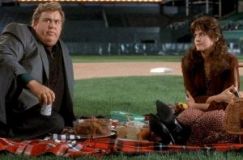 The melodic quality of the mother’s theme is a deep tribute to the land she belongs to, a tribute to an actress, a tribute to a nation, Innisfree, Maureen O’Hara, the Green Ireland… all in this order, in a beautiful meta-cinematographic reminder of one of the most absolute masterpieces in film history, the memorable The Quiet Man by John Ford. Jarre goes in music for the “less is more” motto, resorting to an elaborated simplicity of sorts, filling the sonic spectrum with soft notes through solo instruments, clarinet, piano, oboe, tin whistle… picking up feelings and emotions and giving them back to us as touching and attractive melodies. The melodic quality of the mother’s theme is a deep tribute to the land she belongs to, a tribute to an actress, a tribute to a nation, Innisfree, Maureen O’Hara, the Green Ireland… all in this order, in a beautiful meta-cinematographic reminder of one of the most absolute masterpieces in film history, the memorable The Quiet Man by John Ford. Jarre goes in music for the “less is more” motto, resorting to an elaborated simplicity of sorts, filling the sonic spectrum with soft notes through solo instruments, clarinet, piano, oboe, tin whistle… picking up feelings and emotions and giving them back to us as touching and attractive melodies.
The serene beauty of Teresa’s theme is defined through the piano, showing her sensitivity and fragility of the girl with subtle brushstrokes of saxophone, clarinet and harp in a circular melody that permeates each and every one of the key scenes she is in, in a very beautiful crescendo full of passion and vitality.
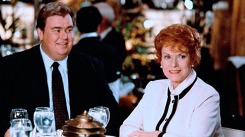 Likewise, we also find a theme devoted to Candy’s sense of guilt, as this is how he feels every time he leaves her mother at home to go out with his friends (who are always striving to find a girl who can make him happy and encourage him not to live any more with his possessive mother) while visions of possible dangers stalking his mother every time he is not with her keep appearing to him. Musically Jarre defines initially his clumsiness through music, in the early notes of the motif («Guilt«), and then goes dark and terrifying resorting to the use of the synthesizer in order to reflect these visions, ending with the reunion at home and the mother’s notes without any of the concerns of the son having come true. Likewise, we also find a theme devoted to Candy’s sense of guilt, as this is how he feels every time he leaves her mother at home to go out with his friends (who are always striving to find a girl who can make him happy and encourage him not to live any more with his possessive mother) while visions of possible dangers stalking his mother every time he is not with her keep appearing to him. Musically Jarre defines initially his clumsiness through music, in the early notes of the motif («Guilt«), and then goes dark and terrifying resorting to the use of the synthesizer in order to reflect these visions, ending with the reunion at home and the mother’s notes without any of the concerns of the son having come true.
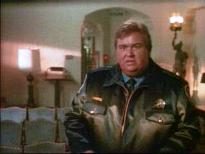 The touches of comedy, always respecting the protagonist’s sensitivity, and defining his character and good nature through music, bring us to the romantic apotheosis found in «Ladder Proposal» and «It Could Be Better«, where during more than fifteen minutes, the composer gives us a tour of all the feelings that grip and then seize the characters: hopelessness, loss, pain, joy, hope, happiness, romance in its most pure manifestation, using the leit-motifs devoted to Teresa, the mother and the guilt, thus reaching a tremendous summit of romanticism in a splendid embodiment, on the part of Jarre, of that idea according to which all that ends well, in film it just ends even better. The touches of comedy, always respecting the protagonist’s sensitivity, and defining his character and good nature through music, bring us to the romantic apotheosis found in «Ladder Proposal» and «It Could Be Better«, where during more than fifteen minutes, the composer gives us a tour of all the feelings that grip and then seize the characters: hopelessness, loss, pain, joy, hope, happiness, romance in its most pure manifestation, using the leit-motifs devoted to Teresa, the mother and the guilt, thus reaching a tremendous summit of romanticism in a splendid embodiment, on the part of Jarre, of that idea according to which all that ends well, in film it just ends even better.
And that’s the moment when Maureen O’Hara‘s toughness and attachment to his offspring becomes understanding and self-awareness, thus closing the circle, and the character of the redhead actress, treasuring her strength of character, indomitable passion and love for her family, in this case for her kindly son, whom she loves above everything and everyone else, and only when she realizes, not without great sorrow in her heart, that the best thing for him is to leave the maternal “nest” and start a new life with the woman he is deeply in love with, will she, in her particular way, let that love back into her life. Although always under her strict conditions and comprehensive and happy look of her patient suitor, an Anthony Quinn who is almost saying goodbye to acting, in a role beautifully outlined with mythical features from past characters, and characterized by a great understanding of life, as that has already shown him everything there is to learn.
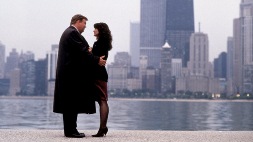 And the score concludes with the voice of Van Morrison and the serene beauty of a song as legendary as «Someone Like You«, leaving us in a state of melancholy and full of Good Feelings at the end of the projection, which leads us again to the classic by Roy Orbison that inspired the film’s title and the score, and which we already had the opportunity to enjoy during the opening credits, while a camera movement of unmatched elegance displayed to us a story in which each one of us is already, Only the Lonely. And the score concludes with the voice of Van Morrison and the serene beauty of a song as legendary as «Someone Like You«, leaving us in a state of melancholy and full of Good Feelings at the end of the projection, which leads us again to the classic by Roy Orbison that inspired the film’s title and the score, and which we already had the opportunity to enjoy during the opening credits, while a camera movement of unmatched elegance displayed to us a story in which each one of us is already, Only the Lonely.
To Itxas
|
No hay comentarios